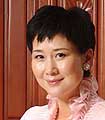|
Relics Buyer Refuses to Pay

Chinese art collector, Cai Mingchao, has identified himself as the "anonymous buyer" behind winning bids for two bronze animal heads that were auctioned off at 31.49 million euros ($39.44 million) at Christie's in Paris. But he said at a press conference in Beijing on March 2 that he refused to pay for looted Chinese relics.
Cai, 44, runs his own auction house in Xiamen, southeast China's Fujian Province. As a well-known antique collector, Cai is also a senior advisor to the National Treasures Fund, which was established in 2002 to help retrieve looted Chinese relics from abroad. Cai first attracted world attention by paying HK$116 million ($23.6 million) for a Buddha image from the Ming Dynasty (1368-1644) at a Sotheby's auction in Hong Kong in 2006, breaking record prices for Chinese artifacts. Cai bade for the bronze heads of a rat and a rabbit at Christie's via telephone on February 25.
Cai refused to pay because he said that the bronzes were once part of a fountain that displayed 12 animal sculptures at the imperial winter resort, Yuanmingyuan, of the Qing dynasty (1644-1911). The garden housing the fountain was sacked and burned down by French and British allied forces during the Second Opium War in 1860, when numerous Chinese relics were looted.
Power Chief Honored

Li Xiaolin, Chairwoman of the China Power Investment Corp., one of China's five largest state-owned power producers, was selected as one of the 10 most influential Chinese women of 2008 in a recent poll sponsored by the Beijing-based publication Women of China.
Li, the 48-year-old daughter of former Premier Li Peng, was recognized for her generosity. In 2001, Li launched an educational fund named after her grandfather Li Shuoxun. Since its establishment, the fund has assisted more than 130 children from impoverished families with nearly 1 million yuan ($143,000). In January 2008, Li donated 370,000 yuan ($53,000) of her 550,000-yuan ($80,000) remuneration from publishing a book to the fund, and used the remainder of the income to establish her own scholarship foundation to help more needy students. She has also funded the treatment of a child suffering from leukemia since 2005.
Artist Rakes in Millions

Zhang Xiaogang, a symbolist and surrealist painter who fetched a combined $44.1 million at art auctions in 2008, is the most wealthy living Chinese artist, according to Rupert Hoogewerf, publisher of the Hurun Report known for its listing of rich Chinese.
Zhang, 51, has sold 208 paintings through auctions. Born in Kunming, southwest Yunnan Province, he is famous for his artistic style featuring an obscure portrait-like format.
Upon graduating from the Sichuan Academy of Fine Arts in 1982, Zhang joined a group of avant-garde painters and his creation of the Bloodline series, gray-hued family portraits with small patches of color on canvas, was a big success. The Big Family, one of the series, fetched $760,000 in 2006 at Sotheby's in New York, setting a record price of contemporary Chinese paintings. Three Comrades, in which Zhang seeks to reflect conflicts of facial calmness and inner turbulence of the Chinese people, sold for more than $2 million at Sotheby's one year later.
"I always think that people have the right to know what the government is thinking and doing, and voice their criticism of government policy."
Chinese Premier Wen Jiabao in an online chat with netizens on February 28
"At last, it is about time to leave, because at the end of the day the U.S. administration was obliged to admit that it can't get rid of all Iraqis who are against America or sympathize with its adversaries."
Saad Hussein, an Iraqi journalist, welcoming President Barack Obama's February 27 announcement to withdraw most U.S. troops from Iraq by the end of August 2010 in a telephone interview with Xinhua News Agency
"We should not allow a new iron curtain to be set up and divide Europe in two parts."
Hungarian Prime Minister Ferenc Gyurcsany, recommending a $240-billion regional bailout plan for Eastern Europe before an emergency EU summit in Brussels at the end of last month. The proposal was finally rejected at the meeting
"It was a national shame that somebody that we refer to as Father of the Nation and his personal belongings are being auctioned off in a foreign land. This kind of concern should be for every national heritage."
Tushar Gandhi, great-grandson of Mahatma Gandhi, protesting the planned auction of the Indian freedom icon's possessions by the Antiquorum Auctioneers in New York on March 4 and 5
"Maybe we will have to make concessions in one case or another."
Swiss Finance Minister Hans-Rudolf Merz, hinting on February 28 that Switzerland might have to make some concessions on banking secrecy that is under growing international criticism for aiding tax evasion | 